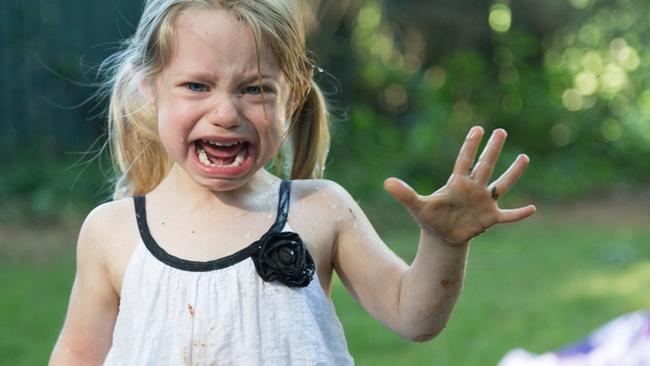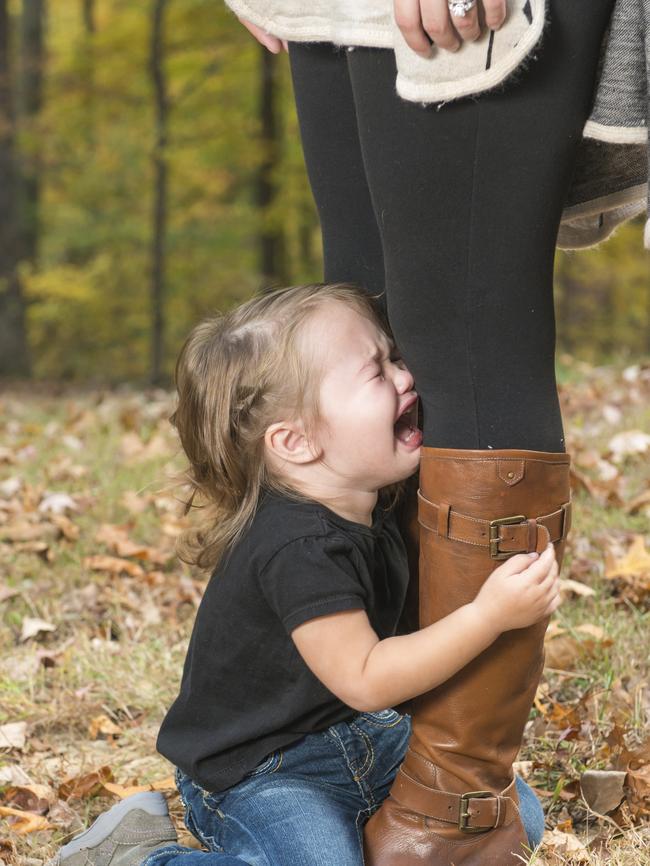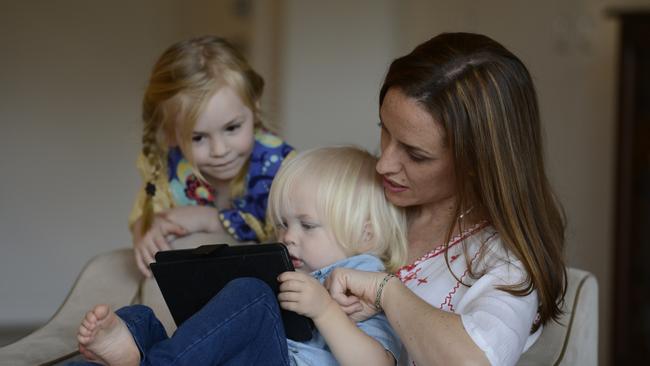Five things you should know about my kid’s tantrums
TANTRUMS are awful for everyone involved, including the kid. So the next time you witness one, swap your sneer for some empathy, writes Shevonne Hunt.

Rendezview
Don't miss out on the headlines from Rendezview. Followed categories will be added to My News.
WHILE my children are not adverse to the odd tanty, I’ve been lucky enough that most of them happen behind closed doors. “Lucky” is a funny word to choose. Tantrums are an awful experience to all involved, not just the child.
So when I’ve heard people talk about the disapproving looks of those around them when their child decides to literally spit their dummy, I’ve been slightly bemused. Surely people understand that tantrums are a natural part of a child’s development? Surely people know that parents — whether they are relaxed or strict — have no control once a tantrum starts? Surely this type of situation is met with sympathy before judgment?
And then both my children (ages three and five) decided to have a spectacular rolling tantrum the length of Sydney’s Oxford Street. We had sitting tantrums, jumping tantrums, hitting tantrums and general upset that continued all the way to the door of our GPs, then through the silent waiting room until they were finally deposited behind closed doors.
Which is where (I got the distinct impression) everyone who crossed our path thought they should be. Behind closed doors.
Don’t get me wrong, after I had carried my son — kicking and screaming — about 100 metres, with my daughter dragging on my bag sobbing her heart out, I was ready to trade them in for a serviceable toaster. But then, I was the one carrying a screaming child and being badgered by another.

I have been a person “sans children” who has cringed at a toddler tantrum. I know how it can look. That parent has no control. That parent needs to pull their child in line. That child is spoiled, and what an unpleasant sound. Please move away and express your emotions somewhere else.
But there are a few things that I want those people to know, the next time they see a child having a tantrum in public.
One. The parent dealing with the tantrum is having a terrible time. As much as you might not like the sound of the child screaming, the parent likes it even less. Most likely they feel your judging eyes boring into their soul, right when they’re trying to help their child calm down. They’ve probably tried several strategies and nothing is working. They feel helpless and hopeless.
Two. Tantrums are a natural part of a child’s development. It’s not because they are ill-bred, spoiled brats. Children have tantrums because they are young, their brains aren’t fully developed, and they can’t express their feelings properly. They have tantrums because they are frustrated, tired or hungry. Not all of these things are under a parent’s control.
Three. Once a child is in full swing, there’s not a lot that can calm them down. It’s what parenting educator Maggie Dent calls the “red room”. When you see a child who is thrashing about they are literally out of control. Imagine what that would feel like, when your emotions are so big and overwhelming all you can do is rage and scream. Many times all you can do is wait for the storm to pass.
Four. Yelling will not stop a tantrum. When you’ve been angry as an adult, how have you felt when someone told you to “calm down”? Did it work? When someone yells at you when you’re angry, does that make you feel suddenly peaceful and able to slow your raging heart? Why should it be any different for children? As I walked up Oxford Street with my little tornado of pain, I wondered what the passing disdainful pedestrians thought I should do. Perhaps they thought I should taser them? Or maybe use a tranquilliser gun?
Five. Big tantrums can scare children, as much as it can scare their parents. My daughter once had a tantrum in the bath. I can’t remember why. I probably told her it was time to get out and she didn’t want to. So she sat in the bath as the water drained out and started to cry. Eventually I had to get her out, and I carried her wet, writhing body to the lounge room where she went on to have the most terrifying tantrum I have ever witnessed. I could see the fear in her eyes, even as she kicked and hit me. And all I could do was hold her and tell her she was all right.

When the dual tantrums to end all tantrums happened the other day, I was lucky enough to have my husband with me. Several times we looked at each other incredulously and laughed. It was, we thought, unbelievable.
But what I found strange, is that not once did I get a rueful smile from a member of the public. After we emerged from the nurse’s room at the GP there were a few conciliatory laughs, but when their cries were most vocal, most public, all I felt was disapproval and a slight hint of disgust.
I thought we had passed beyond the age of “children are to be seen but not heard”, but that seems to only apply if children are behaved and groomed. Which is impossible, as any parent will tell you, regardless of how disciplined (or not) you are as a parent.
Children by their very nature need to grow, experiment, and push boundaries (and buttons). Sometimes it’s unpleasant. Sometimes it will make you cringe. But unless you want to pack children away behind closed doors that’s just the way it is.
Parents can’t always control when and where it happens, but when their child goes off in public, they deserve your sympathy before your judgment.
So next time you see a parent dealing with a thrashing, red-faced child, try a little empathy — for both of them. An understanding smile is enough, because no one is enjoying the experience.
Shevonne Hunt is the presenter of a daily parenting show called Kinderling Conversation on Kinderling Kids Radio.


